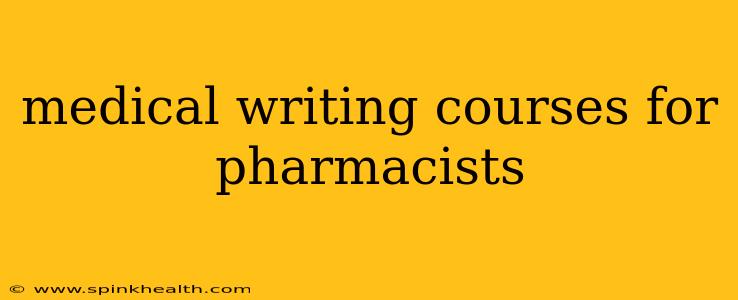The world of pharmaceuticals is constantly evolving, demanding professionals who can communicate complex scientific information clearly and concisely. For pharmacists looking to elevate their careers and make a significant impact, medical writing presents an exciting and rewarding pathway. But where do you begin? This guide navigates the landscape of medical writing courses specifically designed for pharmacists, exploring what to look for and how to choose the best fit for your goals.
Imagine this: you're not just dispensing medications; you're crafting compelling narratives that help doctors understand new research, influence treatment guidelines, and ultimately improve patient care. That's the power of medical writing for pharmacists. It's about translating your deep understanding of pharmacology, drug interactions, and patient safety into impactful documents that shape the healthcare industry.
What to Expect in a Medical Writing Course for Pharmacists
A quality medical writing course tailored for pharmacists should go beyond the basics. It needs to leverage your existing pharmaceutical knowledge and build upon it, focusing on the unique aspects of medical communication within the pharmaceutical realm.
Core Curriculum Components:
- Regulatory Requirements: Understanding the stringent regulations governing medical writing, including those from the FDA and EMA, is paramount. The course should cover the necessary documentation requirements for drug development and marketing.
- Scientific Writing Techniques: Learn to present complex scientific data in a clear, concise, and engaging manner. This includes mastering different writing styles for various audiences (e.g., physicians, regulatory agencies, the general public).
- Medical Terminology and Style Guides: Proficiency in medical terminology and adherence to established style guides (like AMA or ICMJE) are crucial for credibility and consistency.
- Case Studies and Practical Exercises: Hands-on experience through case studies and practical writing exercises will solidify your learning and build confidence.
- Publication Strategies: Learning how to choose the right journal for publication, navigate the submission process, and respond to peer reviews is vital for those aiming for publication success.
- Pharmacovigilance and Safety Reporting: This crucial aspect involves understanding how to report adverse drug events and contribute to post-market surveillance.
Choosing the Right Medical Writing Course: Key Considerations
Not all medical writing courses are created equal. Here are critical factors to consider when making your choice:
Accreditation and Recognition:
Look for courses accredited by reputable organizations or those affiliated with established medical writing societies. This adds weight to your certification and enhances your credibility in the job market.
Instructor Expertise:
The instructors should be experienced medical writers with a strong track record in the pharmaceutical industry. Ideally, they should possess a deep understanding of the regulatory landscape and practical experience in the field.
Course Format and Flexibility:
Consider whether you prefer online, in-person, or hybrid learning options. Choose a format that aligns with your schedule and learning style. Flexibility is crucial for busy professionals.
Networking Opportunities:
A good course will provide opportunities to network with other aspiring and established medical writers. This can lead to valuable collaborations and career advancement.
Career Services and Job Placement Assistance:
Some courses offer career services and job placement assistance, which can be incredibly helpful in transitioning into a medical writing career.
Frequently Asked Questions (FAQs)
What is the salary range for medical writers with a pharmacy background?
Salary ranges vary based on experience, location, and employer. However, medical writers with a pharmacy background often command competitive salaries, especially with advanced certifications.
How long does it take to complete a medical writing course?
Course durations vary. Some are short, intensive programs, while others are more extensive, spanning several months.
Do I need a specific degree to become a medical writer?
While a pharmacy degree is a strong foundation, it's not always a strict requirement. A strong scientific background and excellent writing skills are paramount. Many medical writers have backgrounds in various science disciplines.
What types of jobs can I get with a medical writing certification?
With a medical writing certification, you can pursue various roles, including medical writer, regulatory writer, scientific communicator, or technical writer within pharmaceutical companies, CROs (Contract Research Organizations), or medical communication agencies.
Are there continuing education opportunities after completing the course?
Yes, continuing education is vital in this rapidly evolving field. Look for courses that offer ongoing support and opportunities to update your skills.
Embarking on a medical writing journey can significantly enhance a pharmacist's career prospects. By carefully selecting a course that aligns with your goals and aspirations, you can unlock new opportunities to leverage your expertise and contribute meaningfully to the advancement of healthcare. The key is to find a program that not only teaches the technical skills but also cultivates your passion for clear, impactful communication. Your unique pharmaceutical knowledge combined with strong medical writing skills will position you as an invaluable asset in the industry.

